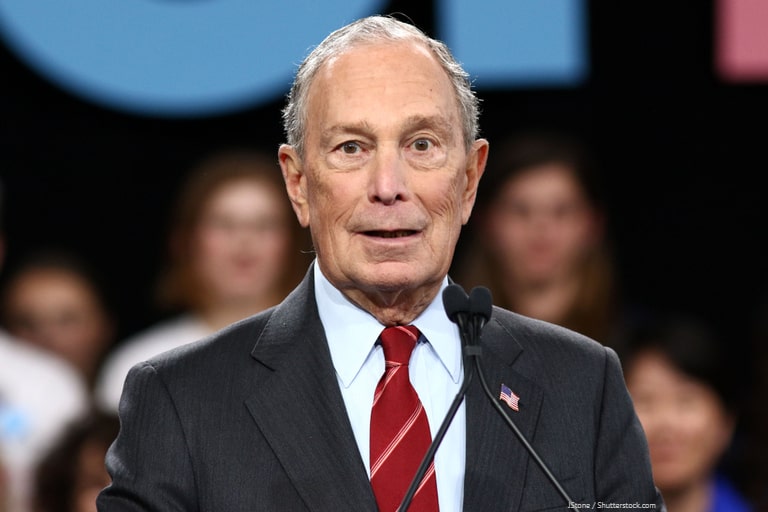By Robert McChesney, University of Illinois at Urbana-Champaign
Presidential candidate Michael Bloomberg is one of the 10 richest persons in the world, with a net worth approaching $60 billion, depending upon the vagaries of the stock and bond markets on any given day.
For anyone who is not a billionaire, it is almost impossible to grasp just how much money this is for a single human being. It would be like calculating the distance of our planet to a distant galaxy in centimeters. Bloomberg could spend $100 million every single day on his presidential campaign between now and election day in November—basically more than any candidate except Bloomberg and fellow billionaire Tom Steyer have spent so far in the entire 2019-20 election cycle—and he would still have a net worth greater than $30 billion. He would remain one of the 30 richest people in the world.
Think about that. Money basically means nothing to Bloomberg. It makes no material difference to his life—anymore than losing a penny would to most people—to spend all this money. At age 77, why the hell not? And wouldn’t it be fun to be president? You only live once.

Bloomberg may well be successful. He has already made media corporations hugely profitable by flooding the airwaves with his expensive and slick advertising—he has shown something corporate America knows well: carpet-bombing advertisements works if you can afford it—and this is just the beginning. He has bought off everyone with a pulse so he has a large chunk of the political class on his payroll, with many more to come. He will accordingly get terrific mainstream press coverage, the type any other candidate would like, and Bernie Sanders can’t even begin to imagine.
In short, Bloomberg is demonstrating the deep problems of the U.S. Supreme Court decision that permits candidates to spend unlimited amounts of their own money on their own campaigns, especially in a period of breathtaking wealth inequality. Why be like the Kochs and Sheldon Adelson and spend a fortune on other people running for office? You are the smart guy after all; spend it on yourself.
If Bloomberg is successful, this could well become the new normal. Presidential elections will be contests between the wealthy who put their own money on the line. Bloomberg demonstrates that no one else could possibly compete with them in terms of resources. We are already a way down that road in Congressional elections. The already fading notion that this is a functional democracy will take another sharp turn in the wrong direction.
Bloomberg explains his decision to run for president as a concern with how Trump is such a dreadful president and that he is best positioned to defeat Trump, restore integrity to governance, and change his deplorable policies, especially on the environment and guns.
Fair enough. But aside from the issue of billionaires buying elections, there is one other extraordinary flaw in his thinking: Bloomberg should be running against Trump as a Republican, not a Democrat. If he actually cared about this country more than stroking his massive ego that is exactly what he would be doing.
This is not such a crazy idea. For starters, Bloomberg is a Republican, or he was until the tea party and then Trump showed up. He fits the profile of the sort of traditional Republican most Americans have been familiar with for generations. He is pro-business, pro-empire, anti-labor, and not especially sympathetic to the concerns of minorities or the dispossessed. These old-school Republicans were committed to the rule of law, however, and to majority rule.
Now Trump has come in and crystallized currents already growing in the Republican Party, like the “tea party” explosion in 2009-10. With his endless lying and rejection of the rule of law, Trump has led the Republicans toward a stronger embrace of authoritarianism, even, dare I say it, fascism. There are discussions about whether Trump would even leave office were he to lose the 2020 presidential election! The career Republican politicians have capitulated to Trump en masse, hence discrediting this party in toto.
Because of the way U.S. elections are structured, we have a two-party system and it is very difficult to replace one of the existing parties with a new one, despite popular support for introducing new ideas into our politics. So the United States is moving toward an exceptionally dangerous place where one of the two main parties is flirting with fascism and dedicated to maintaining political power with only a minority of the country supporting it. It holds the rule of law in contempt.
Bloomberg could have been a real patriot and applied his billions of dollars to challenging Trump and the fascist trend within the Republican party. He could have done everything possible to expose Trump and to locate and encourage anti-Trump Republicans. He could have supported primary challengers on the Republican side to defeat Trump’s allies and enablers. He could have built up a parallel party apparatus employing thousands of Republican operatives at big salaries. He probably would have lost, but you never know for sure until you try. Bloomberg could outspend Trump 20 to 1. He would have been able to force public attention to this issue, and keep it there. He might have made Trump completely crack up. At any rate, he would have had an enormous impact that might have helped to slow and begin to reverse the Trumpian drift.
Then, if he failed to get the Republican presidential nomination, Bloomberg could throw his support and his resources to the Democrats, as he claims he plans to do now.
He would have been a patriot, perhaps even a hero.
Instead, he has opted to bring his takeover project to the Democratic Party. The Democrats are currently in a profound struggle for determining the course of the party between their progressive and establishment wings. By most accounts, patching it up by November will be crucial for electoral success. Bloomberg’s entrance as an establishment savior has won him understandable support from those Democrats who dislike the progressive trend, and believe, erroneously in my opinion, that Bloomberg is the best bet to defeat Trump in November. If Bloomberg is successful in buying the Democratic nomination, or being the kingmaker who decides it, it will generate such anger and antipathy in the progressive wing of the party to the point where even his billions cannot buy off people to see things his way. The party could disintegrate enough that Trump waltzes to a second term, precisely what Bloomberg claims he does not want to have happen.
The moral of the story for establishment Democrats is don’t be seduced by Bloomberg and his billions. He will break up the Democrats and cost them the election if he or someone he supports takes the nomination.
So Bloomberg’s legacy would be that he left his own party to the neo-fascist crowd and went on to blow-up the Democrats, keeping the Republicans in control.
That is 180 degrees away from being a hero, or a patriot.
Robert McChesney is research professor in the Institute of Communications Research and the Graduate School of Library and Information Science at the University of Illinois at Urbana-Champaign. He has written several books on media and politics.
Note: The views expressed in this article are the author/s, and not the position of Intellectual Dose, or iDose (its online publication). This article is republished from Common Dreams under a Creative Commons license.



